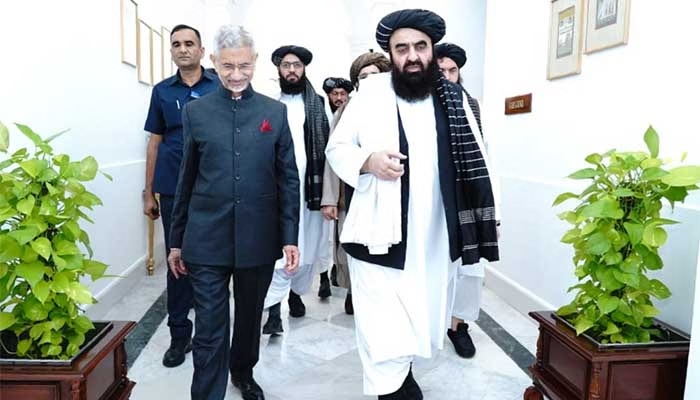In a significant diplomatic move, India restores embassy in Kabul, reinstating full diplomatic status after four years of limited operations. The decision follows the recent visit of Afghan Taliban Foreign Minister Amir Khan Muttaqi to New Delhi, marking a new phase in India-Afghanistan relations. The Indian Ministry of External Affairs (MEA) announced that the technical mission previously functioning in Kabul will now operate again as the Embassy of India in Afghanistan with immediate effect.
This development is seen as a strategic effort by New Delhi to deepen engagement with Afghanistan and expand cooperation in trade, humanitarian aid, and development initiatives. The India restores embassy in Kabul move aligns with Foreign Minister Subrahmanyam Jaishankar’s earlier statement in which he indicated that India was ready to restore full diplomatic operations to strengthen ties with the Afghan people.
India had originally closed its embassy in Kabul in 2021 when the Taliban took control of Afghanistan following the withdrawal of US-led NATO forces. In 2022, India opened a smaller technical mission to maintain limited engagement and support activities such as trade facilitation, medical assistance, and humanitarian relief. However, the recent decision marks a full diplomatic restoration — signaling New Delhi’s growing confidence in reestablishing on-ground presence in Afghanistan.
The official statement issued by the Indian Ministry of External Affairs read:
“In keeping with the decision announced during the recent visit of the Afghan Foreign Minister to India, the government is restoring the status of the Technical Mission of India in Kabul to that of Embassy of India in Afghanistan with immediate effect.”
The MEA further emphasized that this step reflects India’s “resolve to deepen bilateral engagement with the Afghan side in all spheres of mutual interest.” It also reiterated that the Embassy of India in Kabul will enhance India’s contribution to Afghanistan’s development, humanitarian aid, and capacity-building programs — aligning with the priorities and aspirations of Afghan society.
The restoration of the embassy follows a six-day visit by Afghan Foreign Minister Amir Khan Muttaqi to India earlier this month. His trip focused on strengthening bilateral cooperation and exploring ways to expand economic and political engagement. Analysts view this as part of the Taliban government’s broader effort to engage regional powers in hopes of achieving greater economic collaboration and, eventually, international recognition.
Currently, only a handful of countries maintain full embassies in Kabul. These include Pakistan, China, Russia, Iran, and Turkiye. Among them, Russia remains the only country that has formally recognized the Taliban government. India’s decision to fully reopen its embassy does not signify formal recognition of the Taliban regime, but it demonstrates New Delhi’s intent to re-engage diplomatically and practically, particularly in humanitarian and development sectors.
The India restores embassy in Kabul move comes amid evolving geopolitical dynamics in the region. India has historically maintained friendly relations with Afghanistan, investing billions in infrastructure, education, and healthcare over the past two decades. Afghan citizens have long benefited from Indian scholarships and medical visas, and several major development projects — including the Salma Dam and the Afghan Parliament building — were completed with Indian assistance.
However, after the Taliban’s return to power in August 2021, India adopted a cautious approach, scaling down its diplomatic presence but continuing to send humanitarian assistance such as food grains, medical supplies, and vaccines. The reopening of the embassy is thus seen as a carefully calibrated decision to balance India’s strategic interests with its policy of non-recognition of the Taliban government.
Diplomatic observers believe that this step allows India to regain influence in Afghanistan, counterbalance regional competitors, and maintain a presence in a country that shares critical security and economic linkages with South Asia. At the same time, the Taliban leadership is keen to expand cooperation with India, particularly in trade, infrastructure, and humanitarian development.
Despite the progress, challenges remain. Western diplomats argue that the Taliban’s restrictive policies — especially regarding women’s rights and education — continue to hinder broader international recognition. While regional powers like India, China, and Russia are engaging pragmatically with the Taliban administration, they have stopped short of formal recognition, awaiting tangible reforms and inclusivity within Afghanistan’s governance framework.
Still, the India restores embassy in Kabul decision is widely viewed as a significant diplomatic milestone. It not only reflects India’s commitment to the Afghan people but also highlights New Delhi’s broader strategy of constructive engagement without political endorsement. By reestablishing its embassy, India aims to ensure better coordination for humanitarian aid, protect its developmental investments, and foster people-to-people connections that have long defined India-Afghanistan relations.
As the Embassy of India in Kabul resumes full operations, attention will now turn to how this move reshapes regional diplomacy. It symbolizes India’s return to a more proactive role in Afghanistan’s reconstruction and its readiness to cooperate with the Afghan authorities on issues of mutual interest — from trade and connectivity to education and health.
In essence, the India restores embassy in Kabul development marks a new chapter in South Asia’s diplomatic landscape — one rooted in realism, regional cooperation, and the enduring ties between the people of India and Afghanistan.



